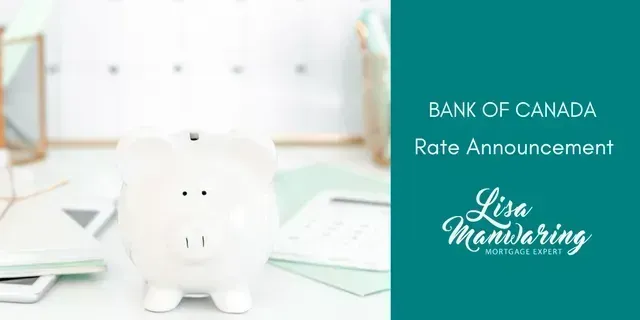Questions About Appraisals During COVID-19
Lisa Manwaring • April 29, 2020

If you're looking to purchase or refinance a property while most of Canada is self-isolating to stop the spread of COVID-19, you probably have some questions around how the pandemic is impacting appraisals.
If you're looking to put a plan together that involves mortgage financing, the best place to start is to contact me directly. I would love to work with you!
However, here a few questions that you may be asking about appraisals and some general information.
1. Can I get an appraisal without having someone come into my property?
Rest assured that to prevent the spread of COVID-19, it is possible to have an appraisal completed without anyone coming into your personal space to view and assess the property.
Instead, the appraiser will use information from MLS data, municipal permits, and property assessment information, as well as information provided by the client or owner to find the property's value.
Be aware that as the provincial government starts reopening and loosening regulations around social distancing and self-isolation, this might change.
2. Is there anything I can provide to assist with the appraisal?
As the appraiser won't be able to assess the property physically, consider providing some interior photos. Your pictures could then be included in the report in place of photos that they would typically take themselves.
Alternatively, if you're a little more tech-savvy, consider a video tour of your property carried out by a Zoom Call, FaceTime, WhatsApp, or Marco Polo.
In these times, appraisers are very flexible; it's a good idea to be available, and as helpful as possible.
3. Will the banks accept an appraisal if the property wasn't physically inspected?
As we're living in unprecedented times, the real estate industry is taking Public Health Authority guidelines and advice seriously and is working together to help stop the spread of COVID-19. This includes adapting the way business is done, and accepting that alternatives to the ordinary course of business may be required.
At this time, most lenders are accepting property valuation from accredited appraisers, even if the property hasn't been physically inspected. Your team of real estate professionals will be able to provide you with guidance at the appropriate time.
4. Are property values coming in lower because of COVID-19
While this is a tough question to answer, here are the facts.
An appraiser's job is to assess the property to establish a value, so that a lender can confidently provide mortgage financing while protecting their investment, making sure there is sufficient equity in case of default.
Establishing property value includes scrutinizing comparable listings; assessing what has sold, at what price, within a reasonable time frame. While also considering how long that property sat on the market.
In the middle of a global pandemic, nothing can be considered normal.
Unfortunately, as we're living through a time of uncertainty, pessimism and conservatism will most likely lead to lower appraisal values.
As MLS data will undoubtedly show a significant drop in sales activity during COVID-19, it might be harder for appraisers to find "comparable properties" to use in assessing another property's value. However, if the values of the properties that did sell remain steady, there is cause to believe that appraised values could remain stable as well. Only time will tell.
If you have any more questions, please contact me directly, I'd love to talk with you.
RECENT POSTS

Bank of Canada maintains policy rate at 2¼%. FOR IMMEDIATE RELEASE Media Relations Ottawa, Ontario January 28, 2026 The Bank of Canada today held its target for the overnight rate at 2.25%, with the Bank Rate at 2.5% and the deposit rate at 2.20%. The outlook for the global and Canadian economies is little changed relative to the projection in the October Monetary Policy Report (MPR). However, the outlook is vulnerable to unpredictable US trade policies and geopolitical risks. Economic growth in the United States continues to outpace expectations and is projected to remain solid, driven by AI-related investment and consumer spending. Tariffs are pushing up US inflation, although their effect is expected to fade gradually later this year. In the euro area, growth has been supported by activity in service sectors and will get additional support from fiscal policy. China’s GDP growth is expected to slow gradually, as weakening domestic demand offsets strength in exports. Overall, the Bank expects global growth to average about 3% over the projection horizon. Global financial conditions have remained accommodative overall. Recent weakness in the US dollar has pushed the Canadian dollar above 72 cents, roughly where it had been since the October MPR. Oil prices have been fluctuating in response to geopolitical events and, going forward, are assumed to be slightly below the levels in the October report. US trade restrictions and uncertainty continue to disrupt growth in Canada. After a strong third quarter, GDP growth in the fourth quarter likely stalled. Exports continue to be buffeted by US tariffs, while domestic demand appears to be picking up. Employment has risen in recent months. Still, the unemployment rate remains elevated at 6.8% and relatively few businesses say they plan to hire more workers. Economic growth is projected to be modest in the near term as population growth slows and Canada adjusts to US protectionism. In the projection, consumer spending holds up and business investment strengthens gradually, with fiscal policy providing some support. The Bank projects growth of 1.1% in 2026 and 1.5% in 2027, broadly in line with the October projection. A key source of uncertainty is the upcoming review of the Canada-US-Mexico Agreement. CPI inflation picked up in December to 2.4%, boosted by base-year effects linked to last winter’s GST/HST holiday. Excluding the effect of changes in taxes, inflation has been slowing since September. The Bank’s preferred measures of core inflation have eased from 3% in October to around 2½% in December. Inflation was 2.1% in 2025 and the Bank expects inflation to stay close to the 2% target over the projection period, with trade-related cost pressures offset by excess supply. Monetary policy is focused on keeping inflation close to the 2% target while helping the economy through this period of structural adjustment. Governing Council judges the current policy rate remains appropriate, conditional on the economy evolving broadly in line with the outlook we published today. However, uncertainty is heightened and we are monitoring risks closely. If the outlook changes, we are prepared to respond. The Bank is committed to ensuring that Canadians continue to have confidence in price stability through this period of global upheaval. Information note The next scheduled date for announcing the overnight rate target is March 18, 2026. The Bank’s next MPR will be released on April 29, 2026. Read the January 28th, 2026 Monetary Report

So, you’re thinking about buying a home. You’ve got Pinterest boards full of kitchen inspo, you’re casually scrolling listings at midnight, and your friends are talking about interest rates like they’re the weather. But before you dive headfirst into house hunting— wait . Let’s talk about what “ready” really means when it comes to one of the biggest purchases of your life. Because being ready to own a home is about way more than just having a down payment (although that’s part of it). Here are the real signs you're ready—or not quite yet—to take the plunge into homeownership: 1. You're Financially Stable (and Not Just on Payday) Homeownership isn’t a one-time cost. Sure, there’s the down payment, but don’t forget about: Closing costs Property taxes Maintenance & repairs Insurance Monthly mortgage payments If your budget is stretched thin every month or you don’t have an emergency fund, pressing pause might be smart. Owning a home can be more expensive than renting in the short term—and those unexpected costs will show up. 2. You’ve Got a Steady Income and Job Security Lenders like to see consistency. That doesn’t mean you need to be at the same job forever—but a reliable, documented income (ideally for at least 2 years) goes a long way in qualifying for a mortgage. Thinking of switching jobs or going self-employed? That might affect your eligibility, so timing is everything. 3. You Know Your Credit Score—and You’ve Worked On It Your credit score tells lenders how risky (or trustworthy) you are. A higher score opens more doors (literally), while a lower score may mean higher rates—or a declined application. Pro tip: Pull your credit report before applying. Fix errors, pay down balances, and avoid taking on new debt if you’re planning to buy soon. 4. You’re Ready to Stay Put (At Least for a Bit) Buying a home isn’t just a financial decision—it’s a lifestyle one. If you’re still figuring out your long-term plans, buying might not make sense just yet. Generally, staying in your home for at least 3–5 years helps balance the upfront costs and gives your investment time to grow. If you’re more of a “see where life takes me” person right now, that’s totally fine—renting can offer the flexibility you need. 5. You’re Not Just Buying Because Everyone Else Is This one’s big. You’re not behind. You’re not failing. And buying a home just because it seems like the “adult” thing to do is a fast way to end up with buyer’s remorse. Are you buying because it fits your goals? Because you’re ready to settle, invest in your future, and take care of a space that’s all yours? If the answer is yes—you’re in the right headspace. So… Are You Ready? If you’re nodding along to most of these, amazing! You might be more ready than you think. If you’re realizing there are a few things to get in order, that’s okay too. It’s way better to prepare well than to rush into something you're not ready for. Wherever you’re at, I’d love to help you take the next step—whether that’s getting pre-approved, making a plan, or just asking questions without pressure. Let’s make sure your homebuying journey starts strong. Connect anytime—I’m here when you’re ready.


